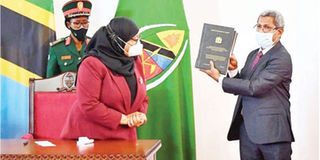Tanzania readies for Covid jabs as Suluhu receives report

Tanzanian President Samia Suluhu (left) reads the title of the report submitted to her by the chairman of a special committee tasked with studying the Covis-19 situation in the country, Prof Said Aboud.
Dar es Salaam
In a major development, Tanzania is now preparing to administer Covid-19 vaccines after a team of experts Friday handed in a report on how the country can roll out the vaccination.
Until recently, the country, under former president John Pombe Magufuli, was against Covid-19 vaccines.
Last month, President Samia Suluhu received a report by a special committee of experts that she formed in April to evaluate the Covid-19 pandemic situation in the country.
Among other things, the team chaired by Prof Said Aboud recommended that the government allows voluntary vaccination and resumes releasing of statistics related to the pandemic.
And on Friday, the committee handed another report detailing how Tanzania can mobilise resources to control Covid-19 as well as the proposals for the vaccination strategy.
Mobilise funds
“The committee has advised different ways of mobilising financial resources from the budget and other stakeholders including international organisations and the private sector,” said the State House in a statement signed by the Presidency spokesperson Gerson Msigwa.
“The money will be used to finance medical equipment, training and the vaccines,” stated Mr Msigwa.
The handing over of the report came just a day after Zanzibar President Hussein Mwinyi told the World Health Organisation’s (WHO) representative to Tanzania, Dr Tigest Ketsela Mengestu, that the archipelago was ready to receive Covid-19 vaccination support and other donations to fight the pandemic.
On the other hand, Dr Mengestu asked the government of Zanzibar to identify the type of vaccine it would need, especially now when Muslims are preparing for Hajj.
“WHO is ready to cooperate with the government of Zanzibar in the vaccination, training of medical experts and other health issues,” she said.
Tanzania is among the six countries in the world which have not yet started vaccinating its citizens. Others are North Korea, Haiti, Chad, Burundi and Eritrea.
On Thursday, the UN warned that Africa was poorly prepared for the third wave of the coronavirus pandemic, with vaccine deliveries at a near-standstill and key resources in frontline care lacking.
“Many African hospitals and clinics are still far from ready to cope with a huge rise in critically ill patients,” the WHO’s regional director for Africa, Dr Matshidiso Moeti, said.
Africa has officially registered over 4.8 million Covid-19 cases with 130,000 deaths, according to the WHO, a figure representing 2.9 per cent of global cases and 3.7 per cent of deaths.
President Suluhu changed Tanzania’s direction in regard to the handling of Covid-19 after she assumed leadership following the death of Dr Magufuli. The late former president had warned that the vaccines were dangerous.
Presentation for Cabinet
According to the statement released on Friday, President Suluhu also directed the Minister for Health, Community Development, Gender, Elderly and Children, Dr Dorothy Gwajima, to prepare a presentation which will be discussed by the Cabinet that will make decision about the committee’s recommendations.
The Head of State also allowed foreign embassies and other international organisations to import vaccines for their people and employees to make their working easy and enable them to comply with guidelines from their respective countries.
However, the importation of vaccines will be coordinated by the Ministry of Health, Mr Msigwa said.
Tanzania last released data on Covid-19 more than a year ago. That data showed that the country only had had 509 cases then.
Local remedies
Since then, Dr Magufuli’s administration adopted the approach that Tanzania was free from Covid-19, with authorities encouraging local remedies such as steam therapy.
However, when swearing-in the ministers she appointed in April, President Suluhu said Tanzania needed to have a clear and understandable position regarding the pandemic so that it can make informed decisions.
Since then, the President and other public leaders started taking precautionary measures, including social distancing and wearing of face masks while attending public functions.





